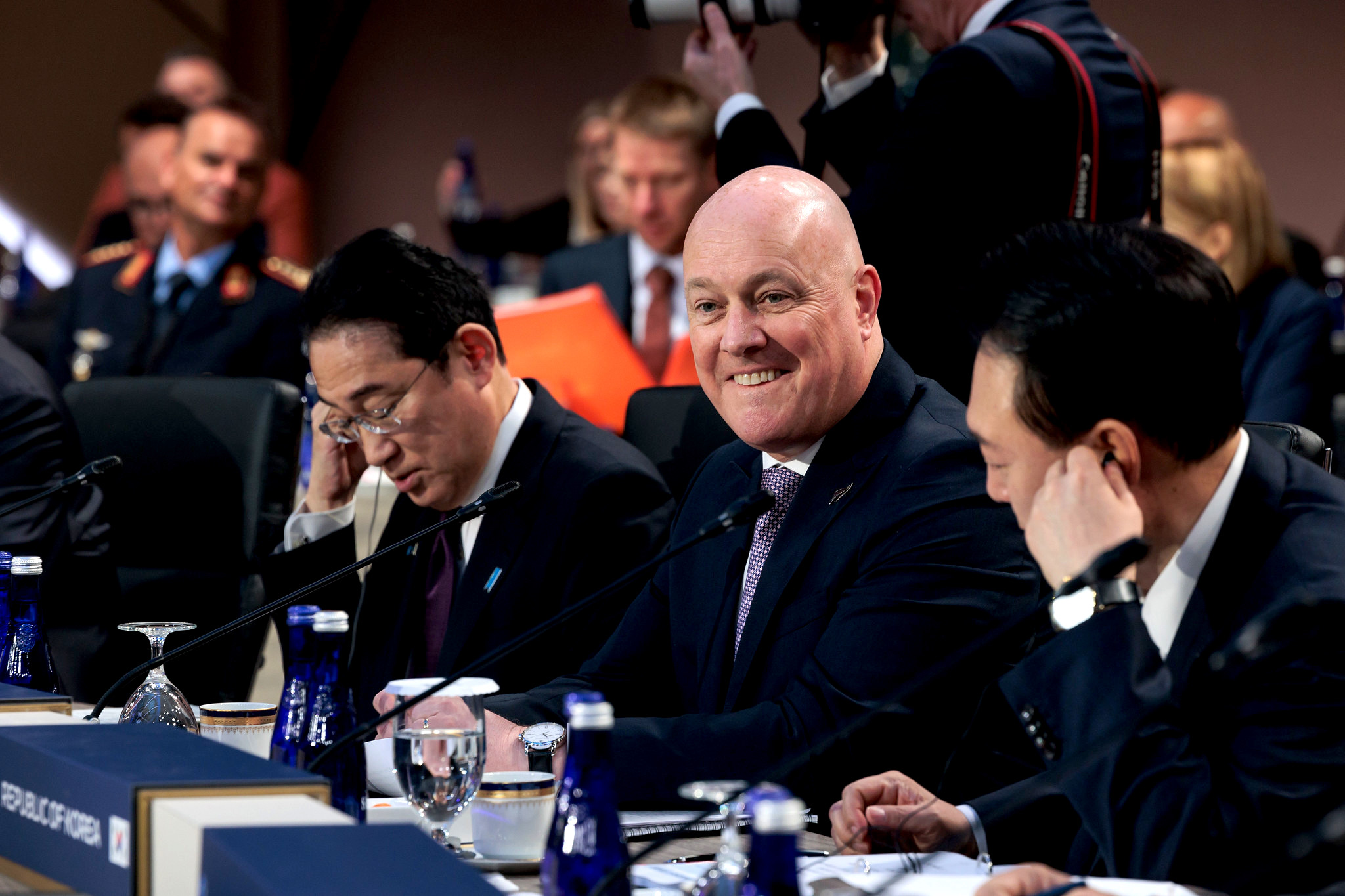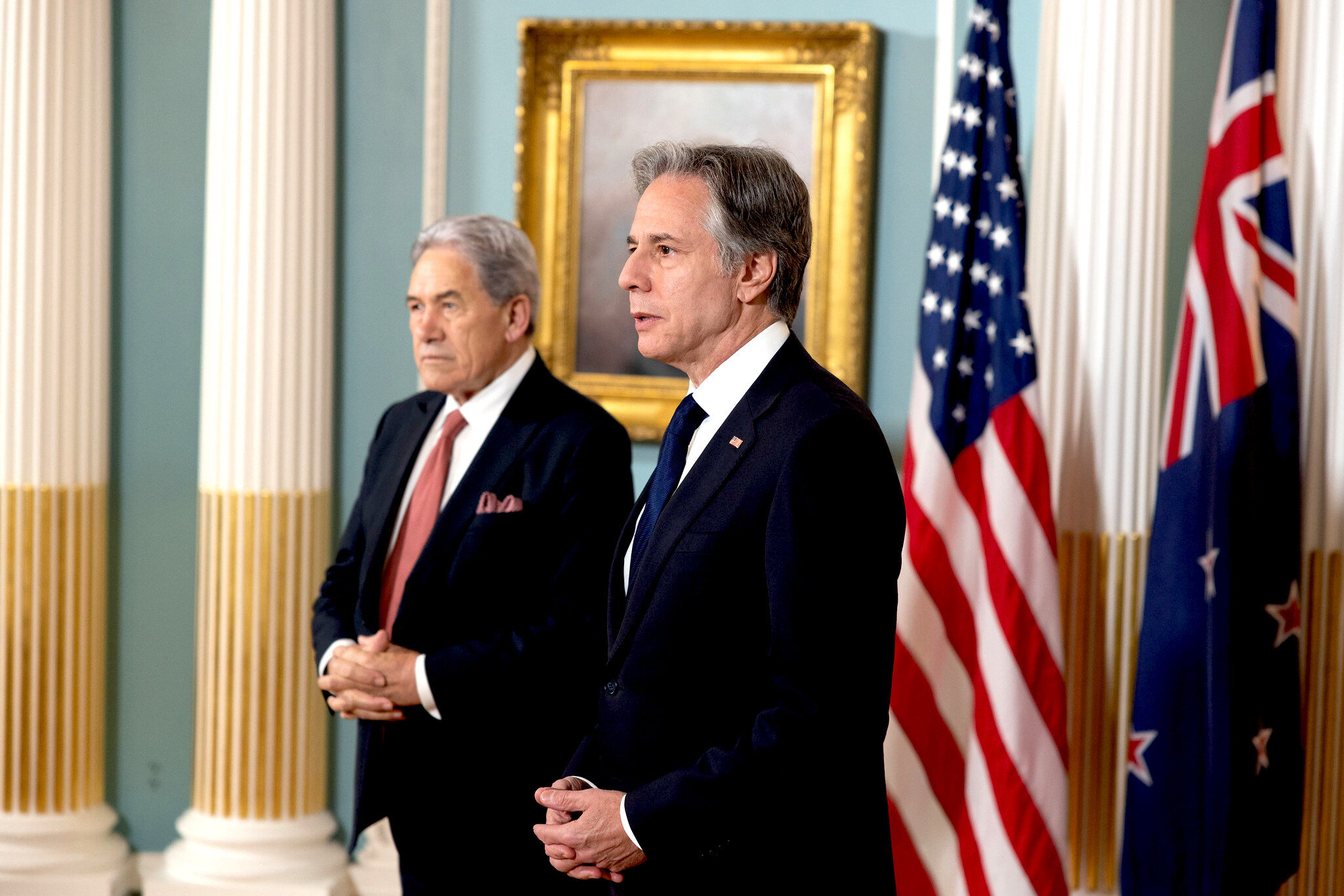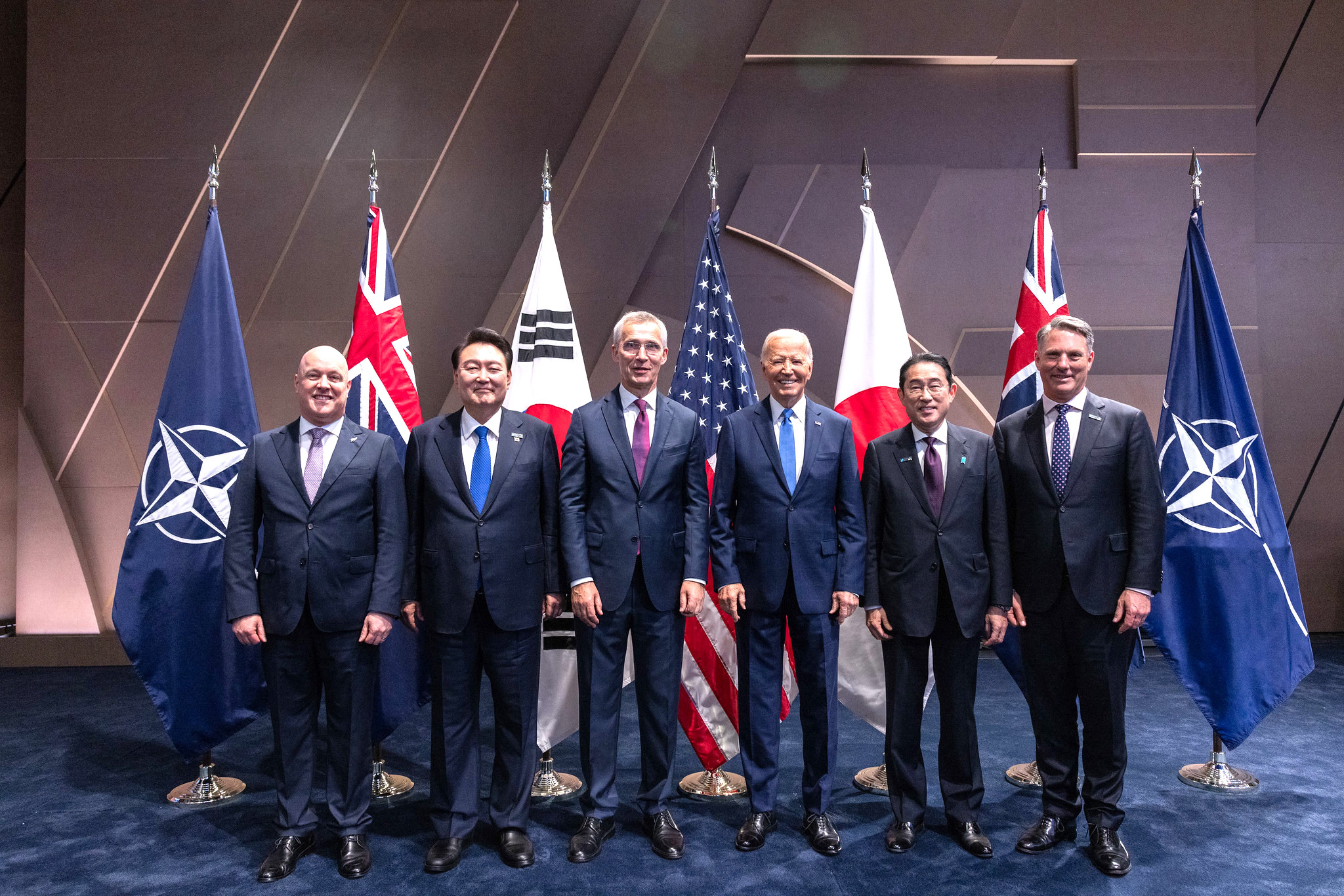New Zealand is ramping up its U.S. sycophancy to get a prime place in Washington’s growing militancy in the region, reports Mick Hall.

New Zealand’s Prime Minister Christopher Luxon, between Japan’s Prime Minister Fumio Kishida, on left, and Korean President Suk Yeol Yoon, right, at the NATO summit in Washington on July 11. (NATO/Flickr, CC BY-NC-ND 2.0)
 Opposition is mounting to New Zealand’s alignment with Western proxy war architecture after Prime Minister Christopher Luxon told a British newspaper he wanted to make the country’s military a “force multiplier” for the U.S. and its allies in the Asia-Pacific region.
Opposition is mounting to New Zealand’s alignment with Western proxy war architecture after Prime Minister Christopher Luxon told a British newspaper he wanted to make the country’s military a “force multiplier” for the U.S. and its allies in the Asia-Pacific region.
Luxon revealed to the Financial Times on July 15 that New Zealand would be completing a “status of visiting forces agreement” with the Philippines, which would facilitate deployment of its military there, after Japan militarized its own relationship with the Philippines following April talks in Washington.
He also said there were plans to boost military spending and to “name and shame” China for alleged spying and cyber-attacks. Luxon added he was “very open” to signing up to Pillar II of AUKUS — the U.S., U.K. and Australia nuclear-propelled submarine alliance designed to confront China militarily in its own backyard. Pillar II focuses on advanced technologies, including AI and hypersonic missile systems.
On July 16 former Prime Minister Helen Clark and ex-leader of the National Party, Don Brash, released a joint statement condemning Luxon’s comments, which followed his presence at the three-day NATO summit in Washington, D.C., that ended at the weekend. They said Luxon was jeopardising New Zealand’s foreign policy and economic security.
The public denunciation reflects growing alarm across the political divide to the ruling coalition’s moves to involve itself in preparations for war with China as the U.S. struggles to compete economically with its peer competitor and battles to maintain hegemony in a world moving inexorably towards multipolarity.
“Just one month after the New Zealand Government hosted the Chinese Premier in New Zealand, and with no hint of a major change in New Zealand foreign policy in the National Party’s election campaign last year, the Prime Minister’s comments to the Financial Times strongly suggest that he has abandoned New Zealand’s independent foreign policy,” Clark and Brash said.
The pair attacked Luxon’s signalling that he would boost defence spending “at a time when public spending is under pressure,” as well as his position on AUKUS, which they said went “well beyond ‘exploring’ options for engagement with it,” the bipartisan position before elections last October.
“These statements orient New Zealand towards being a full-fledged military ally of the United States, with the implication that New Zealand will increasingly be dragged into US-China competition, including militarily in the South China Sea,” they said. “While the rhetoric from both sides is heightened, it must be noted that the US is demanding that China accept the presence of US naval forces in its vicinity in a way which the US itself would not for a moment accept if the boot were on the other foot.”

Clark in 2016. (Global Commission on Drug Policy, Wikimedia Commons, CC BY-SA 4.0)
The former senior politicians also called out the current China threat inflation, designed to politically facilitate a move towards entanglement in U.S. plans to pursue its doctrine of full-spectrum dominance in the Asia-Pacific region.
Their statement said:
“Does China spy on New Zealand? Almost certainly, just as the US, the UK, and countless others, including New Zealand, spy on other countries. Is China the only country spying on New Zealand, and is it only governments that engage in spying? Almost certainly not. The obsessive focus on spying by China suggests an agenda going beyond alerting and equipping New Zealanders to better manage all relevant risks.”
In his FT interview Luxon also referred to China as a “strategic competitor” even though China is the destination for 40 percent of New Zealand’s exports and has enjoyed unfettered access to Chinese markets under a free trade agreement.
“China not only poses no military threat to New Zealand, but it is also by a very substantial margin our biggest export market – more than twice as important as an export market for New Zealand as the US is,” Brash and Clark warned.
“New Zealand has a huge stake in maintaining a cordial relationship with China. It will be difficult, if not impossible, to maintain such a relationship if the Government continues to align its positioning with that of the United States.
New Zealand has for decades sought engagement with China and its inclusion in the international system. A policy of isolating China serves no one’s interests, and has major implications for New Zealand’s economic security.”

Brash in 2011. (Moriori – Own work, CC BY-SA 3.0)
Luxon is seen as not a having seasoned grasp on international affairs and diplomacy, possibly reflected in his comments to the British broadsheet that he intends to pursue a doubling of exports to China over the next 10 years, while simultaneously drawing the country into a military bloc deeply hostile to its key trading partner and declaring the superiority of Western values widely seen as discredited in the Global South and the rest of the world, particularly in light of ongoing acts of genocide in Gaza.
In 2022, NATO stated at its Madrid summit, attended by then Labour Prime Minister Jacinda Ardern, that it viewed China as a systemic competitor that challenged “our interests, security, and values” and sought “to undermine the rules-based international order.” China issued a warning to New Zealand afterwards it had no time for exclusive blocs and military alliances.
“A better approach would be to follow the example of Singapore – friendly to both China and the US, but definitely not in a treaty relationship with either,” Brash and Clark said. “The course which the New Zealand Government is now taking, with no electoral mandate for a radical change to foreign policy, carries huge risks to our country.”
Luxon’s language, however, signals his foreign-policy settings are being determined by engagements with U.S. officials and not electoral mandates. He told the FT: “Our view is very strongly that what happens in the Euro-Atlantic has an impact on the Indo-Pacific.” It reflects the narrative pushed by political elites in the West that if Russia defeats NATO in Ukraine, equally authoritarian China will be emboldened to “invade” Taiwan.

U.S. Secretary of State Antony Blinken and New Zealand’s Foreign Minister Winston Peters in Washington on April 11. (State Department /Chuck Kennedy)
Following the lead of the U.S. and its sub-imperial partner Australia, New Zealand, under both Labour and the National-led coalition, has been warning that a “free and open Indo-Pacific” was under threat, necessitating making the military “operationally credible” for challenges in an increasingly unpredictable global environment.
A defence and strategy policy document and separate report by the country’s biggest spy agency last August suggested China posed an increasing threat to the country, without presenting credible evidence.
There has been a significant uptick in academics linked to the security state amplifying anti-China war narratives, while the media has also played its role in creating a McCarthyite pre-war environment, most notably Stuff Circuit’s largely vacuous documentary “The Long Game,” looking at Chinese Communist Party influence and alleged interference in New Zealand.
NATO’s Push Into Asia-Pacific

From left at the NATO summit in Washington on July 11, 2024: Luxon, South Korea’s President Suk Yeol Yoon, NATO Secretary General Jens Stoltenberg, U.S. President Joe Biden, Japan’s Prime Minister Fumio Kishida and Richard Marles, deputy prime minister of Australia. (NATO/Flickr, CC BY-NC-ND 2.0)
China and Russia are now leading a charge towards an alternative, multipolar world order, principally through the expanding BRICS trading bloc. The U.S. has been using the increasingly vassalized European Union and NATO member states to escalate its proxy war with Russia in Ukraine, green-lighting attacks deep into Russia with rockets it supplies, as well as the delivery of F-16 fighter jets. Most worrying, Germany has agreed to site U.S. long-range missiles in its territory from 2026, with the capability of delivering a nuclear strike inside Russia within minutes.
[Related: Destabilizing the US-Russian Nuclear Balance]
There are growing concerns NATO’s expansion into the relatively peaceful Asia-Pacific region will bring similar conflict and the growing threat of nuclear war.
New Zealand Foreign Minister Winston Peters and U.S. Secretary of State Antony Blinken, after talks at the State Department on April 12, declared in a joint statement that the two countries were “working more closely than ever.” The extent of this new relationship is now being revealed with its increased NATO involvement, a trajectory put in motion under Labour, with Prime Ministers Chris Hipkins and Jacinda Arden attending NATO summits.
Under “Indo-Pacific 4,” Australia, Japan, New Zealand and South Korea will work with NATO on supporting the Ukraine proxy war, artificial intelligence, “disinformation”, and cybersecurity. While the other three countries all finalised “Individually Tailored Partnership Programmes” (ITPPs) with NATO by last year, New Zealand’s agreement is expected to be announced within weeks.
Luxon’s reported comments about revealing supposed cases of Chinese acts of espionage could be more sinister than may be obvious. He was speaking days after the government joined its Five Eyes allies in accusing China of launching cyberattacks against Australia. In March, the government also said China had been behind similar attacks against New Zealand’s Parliament in 2021.
As independent journalist Kit Klarenberg reported this week, Admiral Robert Bauer, head of NATO’s military committee, in June announced the alliance had finalised plans to recognise state-backed cyberattacks on its members as a dedicated pretext for activating Article 5, namely that foreign hacking can be countered with a collective NATO response, up to and including military action.
Although New Zealand is not a member of NATO and only a strategic partner, such actions by Luxon will only ramp up the drumbeat of war, as well as put New Zealand’s economic security in the firing line for the sake of U.S. geostrategic interests.
Mick Hall is an independent journalist based in New Zealand. He is a former digital journalist at Radio New Zealand (RNZ) and former Australian Associated Press (AAP) staffer, having also written investigative stories for various newspapers, including The New Zealand Herald.
This article is from the author’s Substack, Mick Hall In Context.
Views expressed in this article may or may not reflect those of Consortium News.

China should have immediate investigations into all there imports from New Zealand and then stop the lot.
“…. then stop the lot.”
That would condemn NZ citizens to a catastrophic economic collapse. Nobody deserves that, least of all the thousands of Chinese people now residents and citizens here.
Fortunately, it’s unlikely, provided the current government continues with the strategy of previous administration: say all the right things, but keep doing as little as possible. In truth, there’s little that NZ could contribute, in any event. Our defence force is laughably small and poorly-equipped.
China is smart enough to see all of this for what it is. It’s not clear, though, that the US would also see it that way.
When New Zealnd created its nuclear-free zone in 1984, I had a lot of respect for the country and its government.
Now it is just a US government tool.
Its treatment of Kim Dotcom and behaviour in regards to Covid has altered my perspective entirely.
A country desperately trying to be a big player on the world stage, but humiliating itself in the process by becoming a subservient US vassal state.
People should really call out people like Luxon for what they really are – idiots and traitors that are willing to sell out their own country to suck on the tit of American military industrial complex.
Attacking your primary trading partner like this and you’ll end up just like Germany: forced to smile like fools when Americans destroy your property, suffer from mass inflation and economy deindustrialised.
Then when Americans finally decide to push this into a hot war, the final state would be just like Ukraine: to serve as cannon fodder and have all the male population conscripted to die in trench, all while MSM gloriously chanting all “winning” you’d be doing.
I’m a kiwi and Im furious about this dangerous mindless pathetic empire greasing by Luxon, who gives every impression of a starstruck adolescent. This wont have us respected. It will just bring deserved contempt from the Majority World. Its the last tragic stage of our backtrack from the Lange era, that began when Clark herself stupidly sent soldiers to Aghanistan.
Many thanks for this, Mick: another timely article.
I’m an old Lefty, but I voted for the current coalition government because of their campaign promises to end the hated and undemocratic co-governance project. It was being pushed through at lightning speed (and covertly for the most part) by the previous government.
I now understand why the Hipkins government was apparently so incompetent at enacting its policy announcements. It was waiting for the co-governance project to be complete, at which point it would defer to its “co-governance partners” as to which policies would get priority.
I did not vote for, and am alarmed by, this pivot towards the US and AUKUS, because the coalition parties didn’t campaign on it and thus have no mandate from the electorate. The sole consolation is that, had the Hipkins government been re-elected, it would have followed the same path, by the looks of Hipkins’ comments prior to the election.
Our best hope may be, as a young relative puts it, that the coalition will make enthusiastic noises, while at the same time doing as little of substance as possible.
I note this: “…he intends to pursue a doubling of exports to China over the next 10 years…”
While at the same time joining in with US bellicosity? You cannot have it both ways, Prime Minister!
As do Brash and Clark, I want our polity to continue with an independent foreign policy. Like many fellow citizens, I want NZ out of the 5 Eyes entanglement. I’d prefer non-alignment. Possibly a pipe-dream, but nonetheless…. No politician in this part of the world has any business being at a NATO meeting, much less being complicit in dragging this polity into a strategic partnership with it. We’re a Pacific country.
I want the coalition government to focus on rolling back the co-governance agenda, and working on policies which help to reduce the vaulting crime rate here. And work to improve the disasters which are health, education and welfare is urgently needed. That’ll do to be going on with, Mr Luxon.